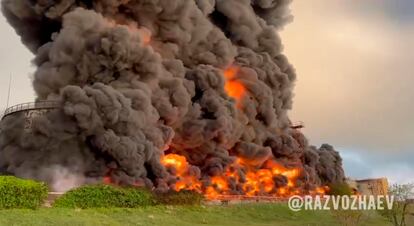Russian official: Ukrainian drones strike Crimea oil depot
The Moscow-installed governor of the port city of Sevastopol posted videos and photos of the blaze on his Telegram channel on Saturday

A massive fire erupted at an oil depot in Crimea after it was hit by two of Ukraine’s drones, a Russia-appointed official there reported Saturday, the latest in a series of attacks on the annexed peninsula as Russia braces for an expected Ukrainian counteroffensive.
Mikhail Razvozhayev, the Moscow-installed governor of Sevastopol, a port city in Crimea, posted videos and photos of the blaze on his Telegram channel.
Razvozhayev said the fire at the city’s harbor was assigned the highest ranking in terms of how complicated it will be to extinguish. However, he reported that the open blaze had been contained.
Razvozhayev said the oil depot was attacked by “two enemy drones,” and four oil tanks burned down. A third drone was shot down from the sky over Crimea, and one more was deactivated through radio-electronic means, according to Crimea’s Moscow-appointed governor, Sergei Aksyonov.
Russia annexed Crimea from Ukraine in 2014, a move that most of the world considered illegal. Ukrainian President Volodymyr Zelenskiy said in an interview this week that his country will seeking to reclaim the peninsula in the upcoming counteroffensive.
The incident comes a day after Russia fired more than 20 cruise missiles and two drones at Ukraine, killing at least 23 people. Almost all of the victims died when two missiles slammed into an apartment building in the city of Uman, located in central Ukraine.
Six children were among the dead, Ukrainian Interior Minister Ihor Klymenko said Saturday, adding 22 out 23 bodies have been identified. One woman remained missing, Klymenko said.
Russian forces launched more drones at Ukraine overnight. Ukraine’s Air Force Command said two Iranian-made self-exploding Shahed drones were intercepted, and a reconnaissance drone was shot down on Saturday morning.
Razvozhayev said the oil depot fire did not cause any casualties and would not hinder fuel supplies in Sevastopol. The city has been subject to regular attack attempts with drones, especially in recent weeks.
Earlier this week, Razvozhayev reported that the Russian military destroyed a Ukrainian sea drone that attempted to attack the harbor and another one blew up, shattering windows in several apartment buildings, but not inflicting any other damage.
Ukraine’s military intelligence spokesperson, Andriy Yusov, told the RBC Ukraine news site on Saturday that the oil depot fire was “God’s punishment” for “the murdered civilians in Uman, including five children.”
He said that more than 10 tanks containing oil products for Russia’s Black Sea Fleet were destroyed in Sevastopol, but stopped short of acknowledging Ukraine’s responsibility for a drone attack. The difference between the number of tanks Yusov and Razvozhayev gave could not be immediately reconciled.
After previous attacks on Crimea, Kyiv also wouldn’t openly claim responsibility, emphasizing, however, that the country had the right to strike any target in response to Russian aggression.
Elsewhere, Ukrainian forces shelled the city of Nova Kakhovka, according to Moscow-installed authorities in the Russian-occupied part of southern Ukraine’s Kherson province. “Severe artillery fire” cut off power in the city, the officials said.
The Ukrainian-controlled part of the province also came under fire on Saturday. Russian shelling in the area of the village of Bilozerka killed one person and wounded another, according to the Kherson prosecutor’s office.
Sign up for our weekly newsletter to get more English-language news coverage from EL PAÍS USA Edition
Tu suscripción se está usando en otro dispositivo
¿Quieres añadir otro usuario a tu suscripción?
Si continúas leyendo en este dispositivo, no se podrá leer en el otro.
FlechaTu suscripción se está usando en otro dispositivo y solo puedes acceder a EL PAÍS desde un dispositivo a la vez.
Si quieres compartir tu cuenta, cambia tu suscripción a la modalidad Premium, así podrás añadir otro usuario. Cada uno accederá con su propia cuenta de email, lo que os permitirá personalizar vuestra experiencia en EL PAÍS.
¿Tienes una suscripción de empresa? Accede aquí para contratar más cuentas.
En el caso de no saber quién está usando tu cuenta, te recomendamos cambiar tu contraseña aquí.
Si decides continuar compartiendo tu cuenta, este mensaje se mostrará en tu dispositivo y en el de la otra persona que está usando tu cuenta de forma indefinida, afectando a tu experiencia de lectura. Puedes consultar aquí los términos y condiciones de la suscripción digital.








































